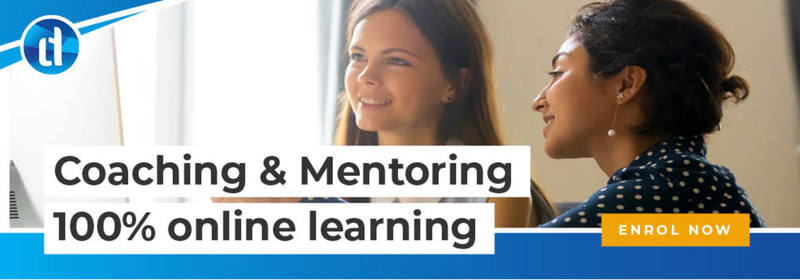More often than not the terms ‘coaching’ and ‘mentoring’ are used interchangeably. Especially when discussing a person’s professional or personal development.
And although their objectives are similar: helping individuals grow to reach their full potential. They are actually separate and it’s important to understand how they differ.
Depending on your experience and area of expertise it could be that you’re more suited to one then another. Alternatively, you might be suited to both, but you still need to know the definition of each.
What’s more, companies tend to look favourably upon those who take on coaching or mentoring roles. As it shows you’re committed to the development of the company and your co-workers.
Individuals taking on these roles also tend to be more fulfilled in their work. It’s an opportunity to give back to the next generation of promising talent and help them overcome any challenges they face.
Key Elements of Mentoring

A mentor is someone who advises and supports people to reach their full potential. Their role is to inspire individuals to continue with their professional development and progress with their careers.
As a result of this mentees will gain confidence, communication skills and exposures to new perspectives.
Long-term
Because mentoring is usually informal, the relationship between the mentee and mentor tends to be long-term.
Although the mentor might support the mentee with a specific goal, the mentoring itself has no end date. This allows the mentee to seek out advice and guidance from their mentor whenever they please.
So that means there’s potential for mentoring to span over many years.
Mentee Drives the Session
A common misconception is that the mentor tells the mentee exactly what they need to do for their development. When in reality, it is the mentee that drives the session and decides what it is they want from their career.
The mentor then provides advice and guidance to help support the mentee’s ambitions.
Advice & Guidance
The mentoring approach differs from coaching as the relationship is more informal. Mentors will listen to the mentee’s aspirations, learn about their current circumstances and advise accordingly.
Where coaching is a more performance-driven approach which focuses on specific skills, mentoring is ambiguous and less structured.
Mentor Guides Through Personal Experience
Due to the personal nature of mentoring mentors will often draw from their own experience to help others. They may recall overcoming their own professional challenges to help their mentees’ find the solution to their situations.
This can help people relate to their mentors and build trust within the relationship.
Key Elements of Coaching
A coach is someone who can train you in a specific area. They will identify and work on areas that need improvement to help you reach your overall goal.
Unlike mentoring, coaching has a typically structured approach and is tailored to generate specific outcomes. Whereas mentoring is about developing on a personal and professional level.
These are the key elements that differentiate coaching from mentoring.
Short-term
Coaching partnerships are usually short-term compared to mentoring. This is because the relationship is objective-driven and focuses on enhancing a certain skill to improve performance.
So the partnership ends once the skill has been acquired. Whereas mentoring lasts longer as the objectives change throughout the mentee's career.
Training & Upskilling
As opposed to advice and guidance for development, a coach enhances your skills for performance.
They often increase your self-awareness so you’re able to target the areas that need the most attention. Whether that’s focusing on your time-management or improving your communication skills.
Overall the aim is to enhance your performance in your job role or prepare you for the next step up. As such, coaches are often used to develop leadership skills.
Coach Drives the Session
The coach takes the lead when it comes to the partnership, unlike mentoring. Although the person will have an input in their sessions it is the coaches responsibility to identify the areas that need improving.
Mentors will guide the development whereas coaches will provide a plan to garner results.
Studying to Become a Mentor or Coach Online

Studying online can give you the key skills required to realise your ambition of becoming a coach or mentor. Online learning gives you the flexibility to study without impacting on your current schedule.
Therefore, you’re able to earn whilst you learn and not worry about your studies affecting your workday. Or having to put in extra hours to play catch up from the ones you’ve missed.
Simply log in and begin learning whenever suits you best. Whether that’s in your lunch break or the evenings, it’s completely up to you.
You are in control of how and when you engage with your studies, so the experience is often more enjoyable. You’re able to relax and process the information at a pace that works for you.
However, just because it’s a more individual-lead learning style doesn’t mean you’re alone. An experienced tutor will be there to guide you throughout your course.
Depending on the learning provider you’ll be able to contact them via email or phone call whenever you need. This ensures you’re on the right track and can progress smoothly with your education.
So, whether you want to become a coach, mentor, or both, you can start today.
Getting Started
At learndirect, we can help you become a qualified coach and/or mentor with one of our online courses.
learndirect is one of the UK’s leading online course providers. Offering a broad range from professional development to GCSEs.
All our courses have flexible payment options and experienced tutors to support your learning. They’ll provide you with constructive feedback and any extra assistance where needed.
To learn more about how to prepare for your online learning experience visit our blog here.
If you’re ready to advance your career and help others at the same time get in touch or browse below.



















